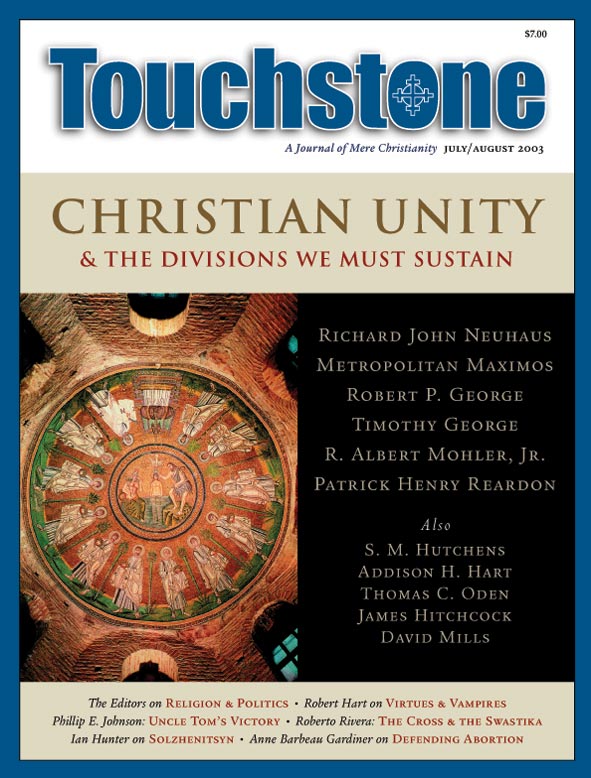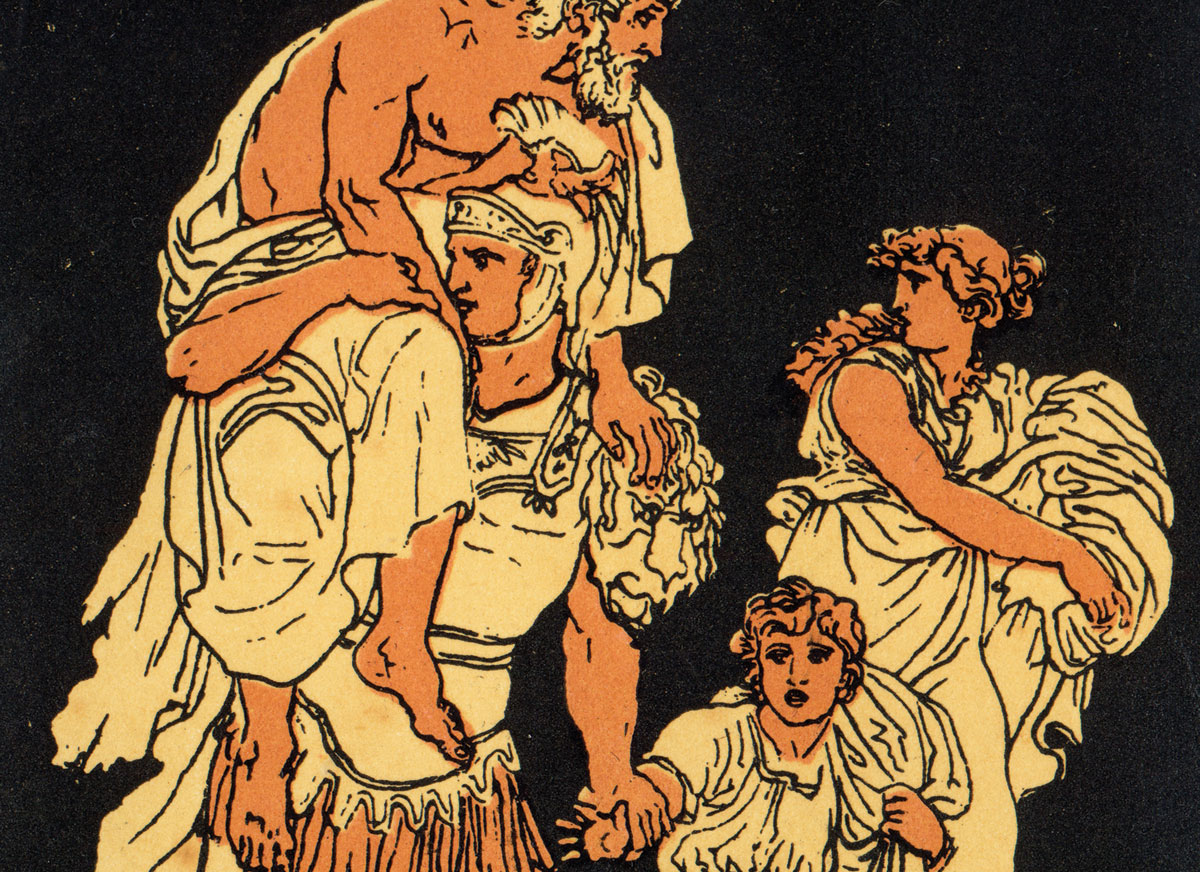The Paradox of Enemies & Allies
A Response to Timothy George
by James Hitchcock
I appreciate this opportunity to respond to Dr. Timothy George. My comments relate to the general theme of the conference—some specifically to Dr. George’s paper, and some to other things, including, in fact, something that came up this morning in the Catholic discussion group, which might be of interest to the larger audience. I’ll start out with things that don’t relate directly to Dr. George’s paper.
Who Is Your Enemy?
An interesting division arose in the Catholic discussion group between Fr. Richard John Neuhaus and Dr. Robert George over whether one can speak of Christian “enemies.” Robby George said yes, we can, while Fr. Neuhaus said he didn’t think it was appropriate to do so. Dr. George said that if we’re supposed to love our enemies, it must mean that we have some. Fr. Neuhaus said yes, but you cannot regard a fellow Christian as an enemy. Then I said, “Jesus said, ‘There will come a day when a man’s enemies will be those of his own household.” Fr. Neuhaus said, “Yes, but he didn’t mean the Church.” And it went back and forth like this.
Now, I don’t want to belabor the word enemy, but I do think that the concept it embodies is of some importance here. What is an enemy? I would define an enemy as someone who wishes you ill, and I really do think that in many cases, the opponents whom we face—again, of course, across denominational lines and dividing all denominations—are indeed people who wish us ill because they really do wish to evacuate the whole substance of the Christian faith. Dr. Timothy George didn’t make up those quotes from John Shelby Spong. You find people who are perfectly capable of engaging in self-satire, and John Shelby Spong is one. Of course, he is a perfect example of what I mean. There are a number of feminists who would serve the same purpose. They have a hard-driving, almost compulsive desire to evacuate the historic Christian faith.
Going back through the history of the Church and looking at all the great disputes that have arisen over the centuries—Arianism, and so forth—it seems to me that, almost every time, it was a sincere disagreement based upon people’s well-intentioned reading of the sacred texts. While we would accuse some of them of being wrong, maybe even perversely wrong, they were attempting to arrive at the truth. I think what is unique about the situation in which we find ourselves today is that many of the modernists make only the barest pretense of sincerely interpreting Holy Scripture.
The real problem we face here goes deeper than any belief or any doctrine. It is a kind of self-worship in which it is possible to say or believe anything you want about God or about morality simply because these are concepts in your own head. So if you wish God to be a woman, God will be a woman. If you see your way clear to venerating more than one God, you can do that because, in the end, God is just a projection of yourself. This is not often admitted, though sometimes it is. Either way, I believe it creates a chasm even wider than the one that Dr. George referred to earlier.
Scripture, Tradition & Other Issues
Dr. George mentioned several factors that he says are crucial to the Evangelical position. There’s the Trinitarian and Christological consensus of the early Church, quite clearly central. He also made several references to the differences between Protestants and Catholics over the question of tradition and church authority. I think it is extremely important in this context to be forthright about these matters, and I am very grateful to Dr. George that he was. I also look forward to the document he and Fr. Neuhaus have talked about: the Evangelical and Catholic discussion of the issue of tradition and Scripture, in which I think we may find some of these matters clarified. I hope so. I’m not a theologian; I’m a mere historian, but I would say in this regard that there would not have been Trinitarian and Christological disputes in the early Church requiring consensus if, of course, it had not been for the fact that people have always disagreed over the meaning of Scripture.
One of the things that Catholicism at least means by tradition is resolving these disputes by some sort of definitive ecclesial pronouncement, which then itself becomes part of tradition. If these questions were solved by the Scriptures themselves, these disputes presumably would not arise. Well, that may be a somewhat simplified view of it, but I think it is worth noting. Dr. George makes reference to the Protestant Reformation and to the principle that the Word alone should be preached and nothing that is contrary to it. Well, no Catholic would say that anything should be preached that is contrary to the Bible, so we certainly agree with that. But in saying the word alone should be preached, it seems to me that we again have that same kind of problem should we use the word Trinity, which is not found in the Bible. I simply use that as an illustration.
James Hitchcock is Professor emeritus of History at St. Louis University in St. Louis. He and his late wife Helen have four daughters. His most recent book is the two-volume work, The Supreme Court and Religion in American Life (Princeton University Press, 2004). He is a senior editor of Touchstone.
subscription options
Order
Print/Online Subscription

Get six issues (one year) of Touchstone PLUS full online access including pdf downloads for only $39.95. That's only $3.34 per month!
Order
Online Only
Subscription

Get a one-year full-access subscription to the Touchstone online archives for only $19.95. That's only $1.66 per month!
bulk subscriptions
Order Touchstone subscriptions in bulk and save $10 per sub! Each subscription includes 6 issues of Touchstone plus full online access to touchstonemag.com—including archives, videos, and pdf downloads of recent issues for only $29.95 each! Great for churches or study groups.
Transactions will be processed on a secure server.
more from the online archives
calling all readers
Please Donate
"There are magazines worth reading but few worth saving . . . Touchstone is just such a magazine."
—Alice von Hildebrand
"Here we do not concede one square millimeter of territory to falsehood, folly, contemporary sentimentality, or fashion. We speak the truth, and let God be our judge. . . . Touchstone is the one committedly Christian conservative journal."
—Anthony Esolen, Touchstone senior editor









